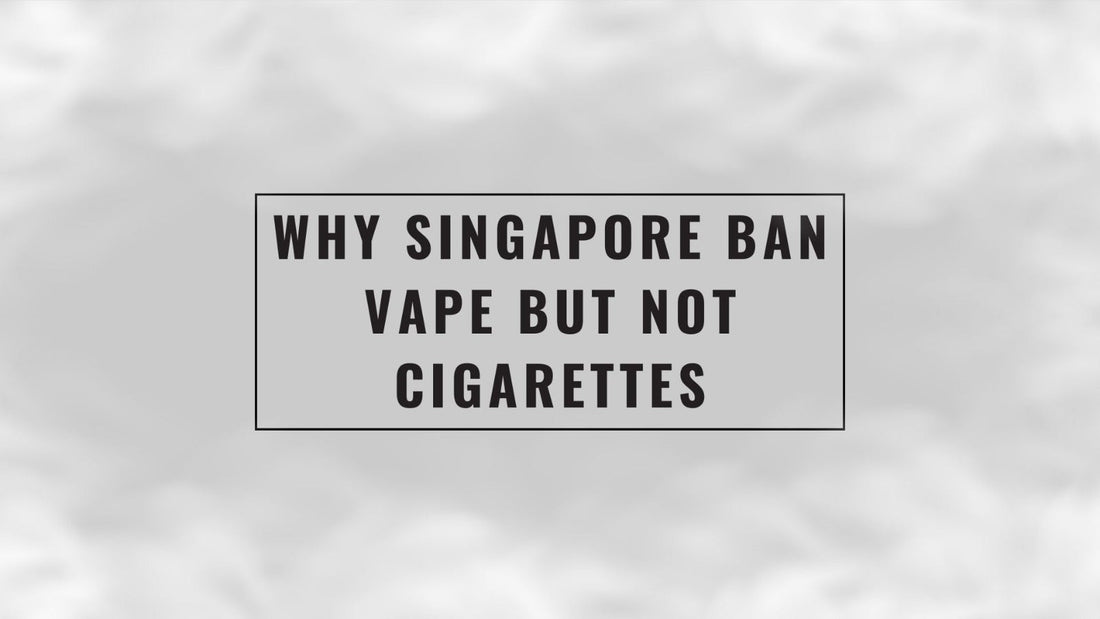
Why Singapore Ban Vape but Not Cigarettes
Share
Introduction
Ever wondered why a country as forward-thinking as Singapore completely bans vaping, yet still allows cigarette smoking? It feels like a contradiction, doesn’t it? On one hand, you have vapes—marketed globally as a “less harmful” alternative—and on the other, the old-school cigarette, known for its lethal health effects. But Singapore, being the nation it is, always has its reasons. Let’s dive into the logic behind this seemingly puzzling policy.

1.0 Understanding Singapore’s Strict Smoking Laws
1.1 A Nation Built on Rules and Order
Singapore is famous for its strict laws. From banning chewing gum to hefty fines for littering, the country thrives on maintaining order. So, when it comes to smoking or vaping, it’s no surprise that the government takes a hardline stance to protect public health and social order.
1.2 The Core Philosophy Behind Health Regulations
Singapore’s health policies often follow the “better safe than sorry” philosophy. If something poses potential harm and isn’t fully understood yet, the government prefers to ban it rather than experiment with public health. Vaping fits that category perfectly.
2.0 The Legal Status of Cigarettes in Singapore
2.1 Why Cigarettes Are Still Allowed
Cigarettes have been around for centuries, and their health risks are well-documented. Instead of banning them outright, Singapore chooses to regulate and heavily tax them. The government recognizes that a total cigarette ban could spark black markets, making control even harder.
2.2 Hefty Taxes and Strict Controls on Tobacco
Cigarette packs in Singapore are among the most expensive in the world—partly due to high taxes aimed at discouraging use. Additionally, plain packaging laws, graphic health warnings, and strict advertising bans make smoking less appealing. Essentially, the goal isn’t to ban smoking entirely but to make it a habit people want to quit.
3.0 The Complete Ban on Vaping Products
3.1 What the Vape Ban Covers
Since 2018, all vaping-related products—like e-cigarettes, vape juice, and even vape accessories—have been banned in Singapore. The law covers import, sale, purchase, and use, leaving zero loopholes. Simply put, if it looks like a vape, it’s illegal. Some of you may be wondering, can I bring vape to Singapore? The answer is no.
3.2 Penalties for Vaping in Singapore
Caught with a vape? You could face a fine of up to SGD 2,000 for possession or use, and even harsher penalties for selling or importing them. The government wants to send a clear message: vaping has no place in Singapore.
4.0 Why the Government Sees Vaping Differently
4.1 Lack of Long-Term Studies on Vape Safety
Unlike cigarettes, which have been studied for decades, vaping is relatively new. The long-term effects are still unclear, and many governments—Singapore included—don’t want to take that risk. The potential health consequences, especially for young people, remain uncertain.
4.2 The Appeal of Vapes Among Youths
Vapes are often marketed as trendy, colorful, and flavored—making them especially attractive to teens. Singapore’s government sees this as a dangerous gateway to nicotine addiction, which goes against their youth protection policies.
4.3 Concerns About Black Market and Addiction
Ironically, banning vapes could also encourage underground sales. But from the government’s point of view, it’s easier to control a single legal substance (cigarettes) than to monitor multiple nicotine delivery systems.
5.0 Comparing Vape and Cigarettes: The Double Standard Debate
5.1 Health Risks: Smoke vs. Vapor
Yes, vaping might be less harmful than smoking, but “less harmful” doesn’t mean “safe.” The vapor still contains nicotine and other chemicals that can harm the lungs and heart. Since Singapore aims for a smoke-free generation, promoting any nicotine product feels counterproductive.
5.2 Economic Interests: Tobacco Tax Revenue
Let’s be real—tobacco tax brings in significant revenue for Singapore. Meanwhile, vapes, being banned, contribute nothing. That financial aspect can’t be ignored when comparing how each product is treated.
5.3 Regulatory Simplicity and Control
Cigarettes are easier to regulate because the system’s already in place. Vaping introduces new devices, liquids, and smuggling challenges. Banning it outright makes enforcement simpler and more effective.
6.0 The Influence of Public Health Campaigns
6.1 The War on Smoking and Nicotine Use
Singapore’s “I Quit” campaign and smoke-free policies have been running for decades. These initiatives focus on reducing nicotine dependence altogether—not replacing cigarettes with another device. In that sense, vaping doesn’t align with the country’s long-term public health vision.
6.2 Education and Deterrence
Singapore educates its citizens early—students learn about smoking dangers from a young age. By completely banning vapes, the message stays clear and consistent: nicotine in any form is harmful.
7.0 What Other Countries Are Doing
7.1 Countries That Ban Vapes
Singapore isn’t alone. Countries like Thailand, India, and Brazil also ban e-cigarettes completely, citing public health risks and youth addiction concerns.
7.2 Nations That Regulate Them Instead
On the flip side, countries like the UK and New Zealand have chosen to regulate vapes, using them as tools to help smokers quit. These nations view vaping as harm reduction rather than a threat.
8.0 How Singapore’s Approach Fits Its Identity
8.1 The “Prevention Is Better Than Cure” Mindset
Singapore’s leaders often emphasize prevention as the best healthcare strategy. Why wait for long-term studies to reveal health problems when you can stop potential harm from spreading in the first place?
8.2 Aligning with the Nation’s Clean Image
Let’s face it—Singapore loves its “clean and green” image. Banning vapes helps preserve that reputation by avoiding public vaping clouds, littered pods, and youth culture associated with vaping elsewhere.
9.0 The Future of Vaping and Smoking in Singapore
9.1 Possible Legal Reforms and Discussions
Could things change? Maybe, but not anytime soon. Unless more global evidence proves vaping’s long-term safety, Singapore’s position will likely remain firm.
9.2 Public Opinion and Youth Trends
Interestingly, younger Singaporeans are more open to harm-reduction strategies like vaping. However, as long as health authorities and policymakers prioritize caution, the law isn’t expected to shift.
Conclusion
So, why does Singapore ban vapes but not cigarettes? It’s all about control, caution, and consistency.The government already knows how to regulate cigarettes and prefers to discourage use through taxes and education rather than outright prohibition. Vapes, on the other hand, are seen as unpredictable, trendy, and potentially more addictive for youth.
In true Singapore fashion, it’s about taking the safest route possible—even if it seems contradictory from the outside. Whether you agree or not, the logic is clear: when in doubt, ban first and study later.
FAQs
Q1: Is vaping legal in Singapore?
A1: No. All forms of vaping, including possession and use, are illegal in Singapore.
Q2: What is the penalty for using a vape in Singapore?
A2: You can be fined up to SGD 2,000 for using or possessing a vape device.
Q3: Why doesn’t Singapore ban cigarettes as well?
A3: Cigarettes are heavily regulated and taxed, and banning them could lead to uncontrollable black-market sales.
Q4: Can tourists bring vapes into Singapore?
A4: No. Even tourists are prohibited from bringing vapes into the country—doing so may result in fines or confiscation at customs.
